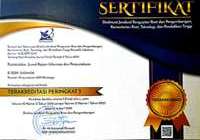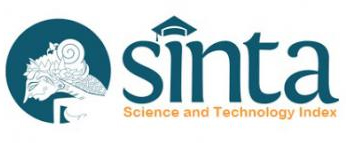Penelitian Permainan Rakyat: Konten Analisis (Content Analysis) Pada Website Garuda RISTEK-BRIN
DOI:
https://doi.org/10.21154/pustakaloka.v13i2.2880Keywords:
folk games, culture of object, analysis content, Garuda RISTEK-BRINAbstract
The folk games are the one development of object culture to must to the preserve. The researcher has researched traditional games from science various. The purpose this research to know folk games research through content analysis in Garuda RISTEK-BRIN website. The research method use analysis content with qualitative approach. The data collection through literature study from 13 folk games research. Based on result analysis found 5 sub themes consist of architecture desain, the type of traditional games analysis, school teaching materials, song traditional games analysis, and traditional games transformation. The research based on publication year has various year publication. The experience of publication year ups and down after sorted using journal names from the initial letters of journal names a to s. The language used in this study uses Indonesian with differences in the writing of the title, the use of Indonesian English titles, Indonesian titles, and Indonesian English titles. The research 13 studies has 63 types of traditional games with the number of games reaching 77. Folk games from an area become a cultural representation of the area itself. Hopefully this research will provide benefits for the reference and development of the next folk game research.
References
Adit, A. (2020). 8 manfaat permainan tradisional bagi anak. Edukasi.Kompas.Com. https://edukasi.kompas.com/read/2020/01/14/23365621/8-manfaat-permainan-tradisional-bagi-anak?page=all
Alianto, C., & Hidayatun, M. I. (2018). Fasilitas eduwisata permainan rakyat di Surabaya. Jurnal EDimensi Arsitektur, 6(1), 601”“608. http://publication.petra.ac.id/index.php/teknik-arsitektur/article/view/8482/7677
Bengtsson, M. (2016). How to plan and perform a qualitative study using content analysis. NursingPlus Open, 2(6), 8”“14. https://doi.org/10.1016/j.npls.2016.01.001
Creswell, J. W. (2013). Qualitative inquiry & research design: choosing among five approach. Sage.
Djolo, C. C., & Pramono, M. (2020). Analisis peralatan permainan rakyat dan olahraga tradisional: Studi kasus di Museum Negeri Mpu Tantular. Jurnal Kesehatan Olahraga, 8(4), 9”“24. https://jurnalmahasiswa.unesa.ac.id/index.php/jurnal-kesehatan-olahraga/article/view/34994/31119
Edwar, S. N., Roza, Y., & S. (2014). Pengembangan bahan ajar matematika berbasis permainan tradisional rakyat daerah Riau untuk kelaS IV SD. Jurnal Online Mahasiswa (JOM) Bidang Keguruan Dan Ilmu Pendidikan, 1(2), 1”“11. https://jom.unri.ac.id/index.php/JOMFKIP/article/view/21293
Evans, A. M., Grey, C., Hanks, M., Barker, K., Sutton, M., Rogers, J., & Thomas, C. (2020). Reseacrh informs practice: An 18 year content analysis of authorsip in counseling journals. Wisconsin Counseling Journal, 33(1), 3”“16. http://web.a.ebscohost.com.unpad.idm.oclc.org/ehost/pdfviewer/pdfviewer?vid=1&sid=2d0f3fc6-a637-48e0-be9b-be4fce94b342%40sessionmgr4008
Garuda RISTEK-BRIN. (2018). Publishers. Garuda RISTEK-BRIN. https://garuda.ristekbrin.go.id/publisher
Humaira, M. A. (2019). Lagu permainan rakyat “layang-layang” sebagai sastra lisan. Bahastra: Jurnal Pendidikan Bahasa Dan Sastra Indonesia, 3(2), 25”“32. https://jurnal.uisu.ac.id/index.php/Bahastra/article/view/1135/896
Kurniasih, N., Nurizzati, & Z. (2012). Apresiasi masyarakat terhadap tradisi lisan permainan rakyat Jaran Kepang di Kanagarian Simalidu Kecamatan Koto Salak Kabupaten Dharmasraya. Jurnal Bahasa Dan Sastra, 1(2), 42”“50. http://ejournal.unp.ac.id/index.php/ibs/article/view/190/147
Kurniawan, M. F., Atmadja, N. B., & Mudana, I. W. (2019). Permainan rakyat sebagai sumber belajar sosiologi di sma: Studi kasus tradisi Mageburan di Desa Adat Sekumpul, Sawan, Buleleng, Bali. Jurnal Pendidikan Sosiologi Undiksha, 1(2), 216”“223. https://doi.org/10.23887/jpsu.v1i2.26840
Kyngäs, H., Elo, S., Pölkki, T., Kääriäinen, M., & Kanste, O. (2011). Sisällönanalyysi suomalaisessa hoitotieteellisessä tutkimuksessa [The use of content analysis in Finnish nursing science research]. Hoitotiede, 23(2), 138”“148.
Munawaroh, L., Budiono, A. N. ., & Mutakin, F. (2019). Upaya meningkatkan karakter mandiri siswa TK B Puspa Melati Jember melalui media permainan rakyat engklek. Jurnal Consulenza : Jurnal Bimbingan Konseling Dan Psikologi, 2(2), 42”“48. https://doi.org/10.36835/jcbkp.v2i2.716
Nurmahanani, I. (2017). Penelitian folklor permainan rakyat Sunda di Kampung Cikondang Jawa Barat dan internalisasi nilai didaktisnya di sekolah dasar. Didaktik: Jurnal Pendidikan Ke-SD-An, 12(2), 23”“36. https://ejournal.upi.edu/index.php/MetodikDidaktik/article/view/7682/4942
Undang-Undang Republik Indonesia Nomor 5 Tahun 2017 Tentang Pemajuan Kebudayaan, Pub. L. No. 24 Mei 2017. Lembaran Negara Republik Indonesia Tahun 2017 Nomor 104, Presiden Republik Indonesia 1 (2017). https://www.jogloabang.com/pustaka/uu-5-2017-pemajuan-kebudayaan
Purwaningsih, D., & S. (2020). Edukasi konservasi penyu melalui permainan rakyat. ARSY : Jurnal Aplikasi Riset Kepada Masyarakat., 1(1), 51”“57. http://journal.al-matani.com/index.php/arsy/article/view/30/24
Pusat Data dan Teknologi Informasi Kementerian Pendidikan dan kebudayaan. (2020). Statistik Kebudayaan. Pusat Data dan Teknologi Informasi Kementerian Pendidikan dan kebudayaan. http://publikasi.data.kemdikbud.go.id/uploadDir/isi_3C248342-65C0-4890-AD2A-7DFAEE1AB5AC_.pdf
Ralibi, R., Syarief, A., & Irfansyah, I. (2018). Perancangan mobile game berdasarkan permainan rakyat dodombaan untuk membangun interaksi sosial antar pemain. Serat Rupa Journal of Design, 1(2), 343”“354. https://doi.org/10.28932/srjd.v1i2.457
Rasyid, S., Saman, S., & Syahrani, A. (2016). Klasifikasi kosakata permainan rakyat Melayu Sambas: Pendekatan etnolinguistik. Bahastra: Jurnal Pendidikan Bahasa Dan Sastra Indonesia, 35(2), 75”“101. http://journal.uad.ac.id/index.php/BAHASTRA/article/view/4863/2694
Saatci, G. (2020). The role of local festivals from the brochure layout perspectives in creating a destination image: A content analysis research. Journal of Yasar University, 15(57), 24”“37. http://web.a.ebscohost.com.unpad.idm.oclc.org/ehost/pdfviewer/pdfviewer?vid=1&sid=40ecc043-4029-4bca-a529-d953814d5bcb%40sessionmgr4007
Sari, E. P., Roza, Y., & Solfitri, T. (2014). Pengembangan bahan ajar matematika untuk kelas V SD berbasis permainan tradisional rakyat daerah Riau. Jurnal Online Mahasiswa (JOM) Bidang Keguruan Dan Ilmu Pendidikan, 1(2), 1”“15. https://jom.unri.ac.id/index.php/JOMFKIP/article/view/21291/20600
Syahrani, A., Amir, A., & Rasyid, S. (2011). Makna leksikal permainan rakyat Melayu Sambas: Pendekatan etnolinguistik. Jurnal Elektronik Wacana Teknik, 2(2), 225”“252. http://wacanaetnik.fib.unand.ac.id/index.php/wacanaetnik/article/view/41/48
Talan. T., DoÄŸan, Y., & Batdı, V. (2020). Efficiency of digital and non-digital educational games: A comparative meta-analysis and a metathematic analysis. Journal of Research on Technology in Education, 52(4), 474”“514. https://doi.org/10.1080/15391523.2020.1743798
Downloads
Published
Issue
Section
License
Requirements to be met by the author as follows:
- Author storing copyright and grant the journal right of first publication manuscripts simultaneously with licensed under the Creative Commons Attribution License that allows others to share the work with a statement of the work's authorship and initial publication in this journal.
Authors can enter into the preparation of additional contractual separately for non-exclusive distribution of a rich version of the journal issue (eg: post it to an institutional repository or publish it in a book), with the recognition of initial publication in this journal.
Authors are allowed and encouraged to post their work online (eg, in institutional repositories or on their website) prior to and during the submission process, because it can lead to productive exchanges, as well as citations earlier and more severe than published works. (see The Effect of Open Access).















